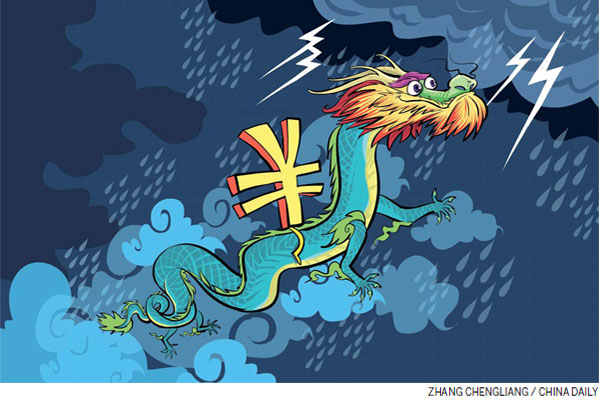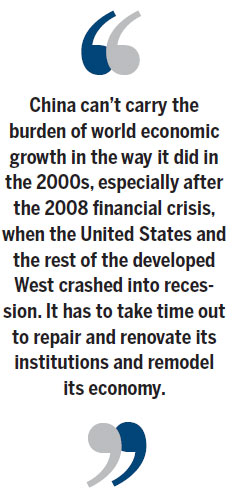China's future is everyone's future
Updated: 2015-09-11 07:28
By Giles Chance(China Daily Europe)
|
|||||||||||
Rest of world has to reach level of understanding to share stability and prosperity
On Aug 11, global financial markets were stunned when the People's Bank of China, the central bank, announced without warning that the yuan would be allowed to find its own market level against the dollar and other major currencies. The yuan, which since 2012 had strengthened against the US dollar, fell by more than 3 percent over the course of several days, before stabilizing.
Financial reporting around the world was full of the event. Most commentators believed that a fall in the yuan's value, which could help promote Chinese exports, displayed the Chinese government's desperation to stop the slide in its economy. For them, it was a sign of how bad things were getting in China as the government tried to shift demand from investment spending to consumption, allowing the economy to slow in the process. Markets slid around the world in response to lower expectations of Chinese growth, with the Dow Jones and Euro stock indices each falling by nearly 10 percent in August.

A few weeks later, we can see more clearly that the real importance of China's currency announcement is to underline China's enormous significance in the daily lives of people around the world. The only other factor today with a comparable market influence to China's currency readjustment is the US Federal Reserve's decision on when to raise interest rates, which will have a knock-on effect around the world because of the dollar's role as the world currency.
In fact, China's global economic importance today may even be greater than that of the US, because the Chinese economy is more open to world trade. China's twin roles, as the global processing center for exports to the developed world, and as the major world buyer of most types of commodities, from copper and cotton to oil and iron ore, give it great economic significance. In 2014, the combined total of Chinese imports and exports was 41 percent of the Chinese economy. The comparable 2014 figure for the United States was 30 percent.
One thing we learned from the strong market reaction to China's currency announcement in August was that what happens in China really does matter to everyone else. We live in an increasingly interdependent and interrelated world. This effect is magnified every day by constant technological improvements which bring people closer together. We see this today in the unexpected arrival of refugees in Europe, in huge numbers, from North Africa and the Middle East, particularly from Syria. In such an interconnected world, a growing China will affect lives in the West more and more, and vice-versa.

Yet most people who were born before 1985 still live in the relatively unconnected world of 20 or 30 years ago, when the Internet was unknown, and smartphones and low-cost international air travel were unthought of. Since 2000, Chinese real estate has risen in value by a factor of 5 or 10 times in many cities. As a result of this, and the success of the Chinese economy, in a few years, a whole Chinese generation based in eastern and parts of central China has progressed from humble economic circumstances to affluence. At the same time, many people in the West who live outside the major cities have seen their purchasing power stand still, or even shrink. Huge change affects our interconnected world, but our minds cannot change at the same speed. Most Westerners do not understand the dimension of the change in China since 1980, let alone since 2000. They still rely on the perceptions they learned when they were growing up.
The reaction to China's currency announcement in August did not just reflect China's importance to the rest of the world. It showed the Western lack of comprehension of China's development, and what it means for them. Most people in 1980 would have been apprehensive about the effects of a modernizing China on the rest of the world, and would have agreed with Napoleon's famous saying: "Let China sleep, for when she wakes, the world will tremble".
But the joining of China's huge labor force to the global economy starting in the 1990s, which brought much lower prices for everyday manufactured goods, and 10 years later, the massive increase in Chinese demand for commodities that provided huge windfalls for resource-rich countries like Australia, Brazil, Chile and South Africa, have meant that China's emergence has brought much more good than bad to the rest of the world. And, of course, these two big trends have had a huge impact on the global economy.
Now that the Chinese government has taken the advice of its own (and other) think-tanks and is conducting a fundamental economic structural overhaul of the world's second-largest economy to ensure its economic and environmental sustainability, its relationship with the developed world has to change.

China can't carry the burden of world economic growth in the way it did in the 2000s, especially after the 2008 financial crisis, when the United States and the rest of the developed West crashed into recession. It has to take time out to repair and renovate its institutions and remodel its economy.
The global impact of this "time-out" will have some negative aspects, in the short to medium term. Moving from a managed to a market-led Chinese economy will take a number of years, and is bound to bring more economic and financial volatility and uncertainty. Change, which destroys the old in order to create the new, involves uncertainty and loss, in the same way that autumn gales and winter snow destroy old trees before giving way to spring flowers and summer sun.
The real meaning of the events of August in the financial markets is to demonstrate that China's future is everyone's future, because in our interconnected world, China has become a part of us, and we are a part of it. Today's challenge is to transcend our separate systems of thought and culture so as to be able better to understand and appreciate each other, not just experience each other. The level of mutual understanding between China and its neighbors in the world must improve to the point that people everywhere can understand China's essentially peaceful aims and support its development goals, as a way of furthering their own well-being and prosperity.
China's economic and social transformation is still at an early stage. It has a long way to run before the Chinese can feel that they are living up to the greatness of their Tang and Han ancestors, and are realizing their full potential as one of the world's largest and most culturally significant nations. In order for that to happen, the rest of the world has to reach a level of understanding about China, not evident at present, which will permit this large country to achieve its possibilities, and permit us to share China's stability and prosperity.
The author is a visiting professor at Guanghua School of Management, Peking University. The views do not necessarily reflect those of China Daily.
(China Daily European Weekly 09/11/2015 page12)
Today's Top News
Economy will not see a hard landing: Premier Li
Russian military experts present in Syria
Hungarian TV journalist fired for tripping up fleeing migrants
Inside look at new products launched by Apple
China's CPI up 2% in August
Queen Elizabeth 'never aspired' to become UK's longest-reigning monarch
Rolls-Royce aims to widen appeal with new convertible
'FX forwards measure is not capital control'
Hot Topics
Lunar probe , China growth forecasts, Emission rules get tougher, China seen through 'colored lens', International board,
Editor's Picks

|

|

|

|

|

|






